Applied Management Theory: Reflective Journal on Leadership & Decision
VerifiedAdded on 2023/06/03
|7
|1848
|59
Journal and Reflective Writing
AI Summary
This reflective journal delves into the concepts of leadership and decision-making within the framework of applied management theory. The leadership section explores the importance of leaders in motivating employees, understanding their strengths and weaknesses, and fostering a supportive environment. It reflects on personal experiences, highlighting the shift from autocratic leadership to collaborative approaches and the value of teamwork. The journal further discusses the aspiration to become an inspirational leader by consulting with team members and providing them with the necessary support and recognition. The decision-making section examines the significance of sound decisions in navigating organizational challenges and enhancing customer satisfaction. It recounts a personal experience where improved employee communication led to increased profits. The journal concludes with a plan to apply decision-making principles in the future by identifying problems, setting objectives, consulting with peers, and implementing the best alternatives for organizational success. Desklib offers a wide array of resources, including past papers and solved assignments, to support students in their academic journey.
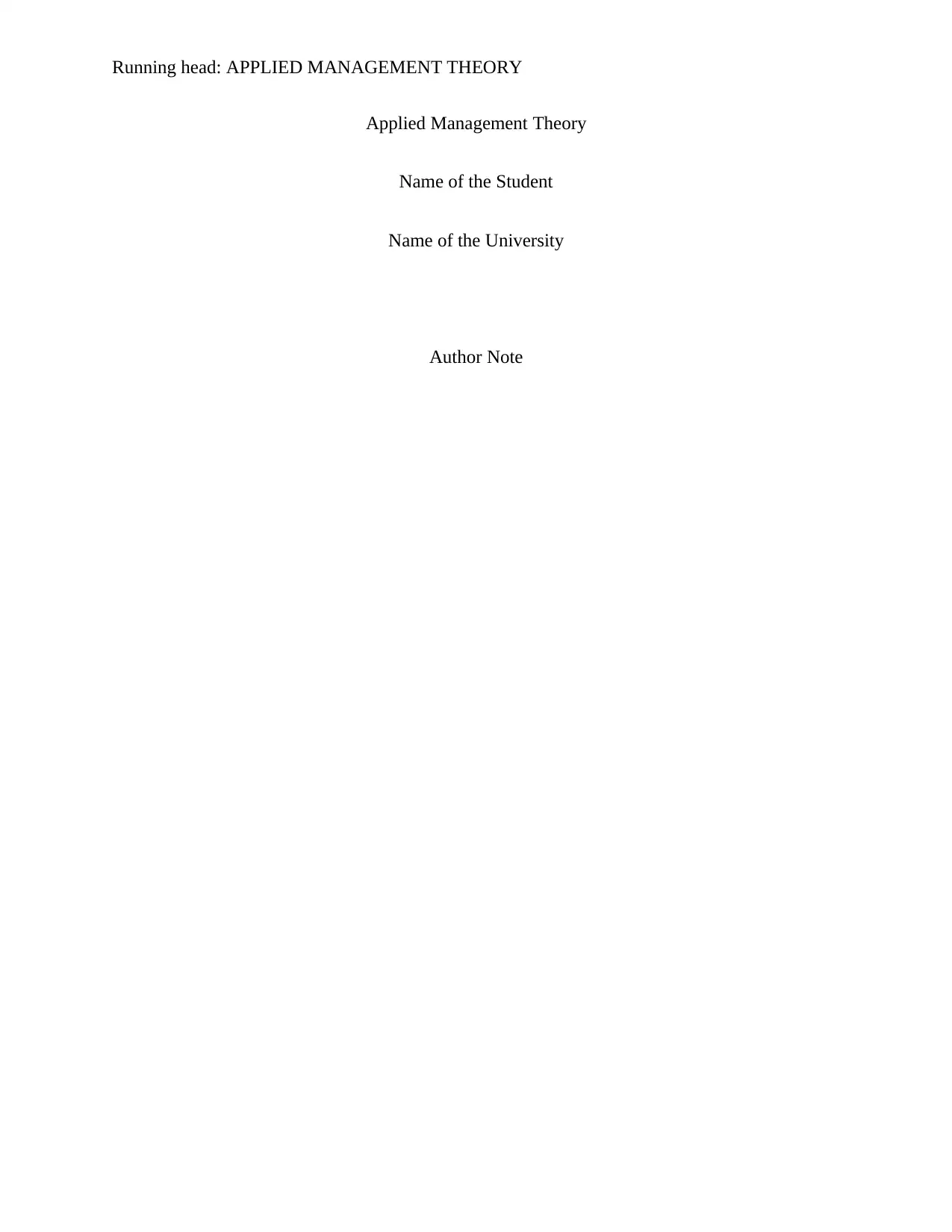
Running head: APPLIED MANAGEMENT THEORY
Applied Management Theory
Name of the Student
Name of the University
Author Note
Applied Management Theory
Name of the Student
Name of the University
Author Note
Paraphrase This Document
Need a fresh take? Get an instant paraphrase of this document with our AI Paraphraser
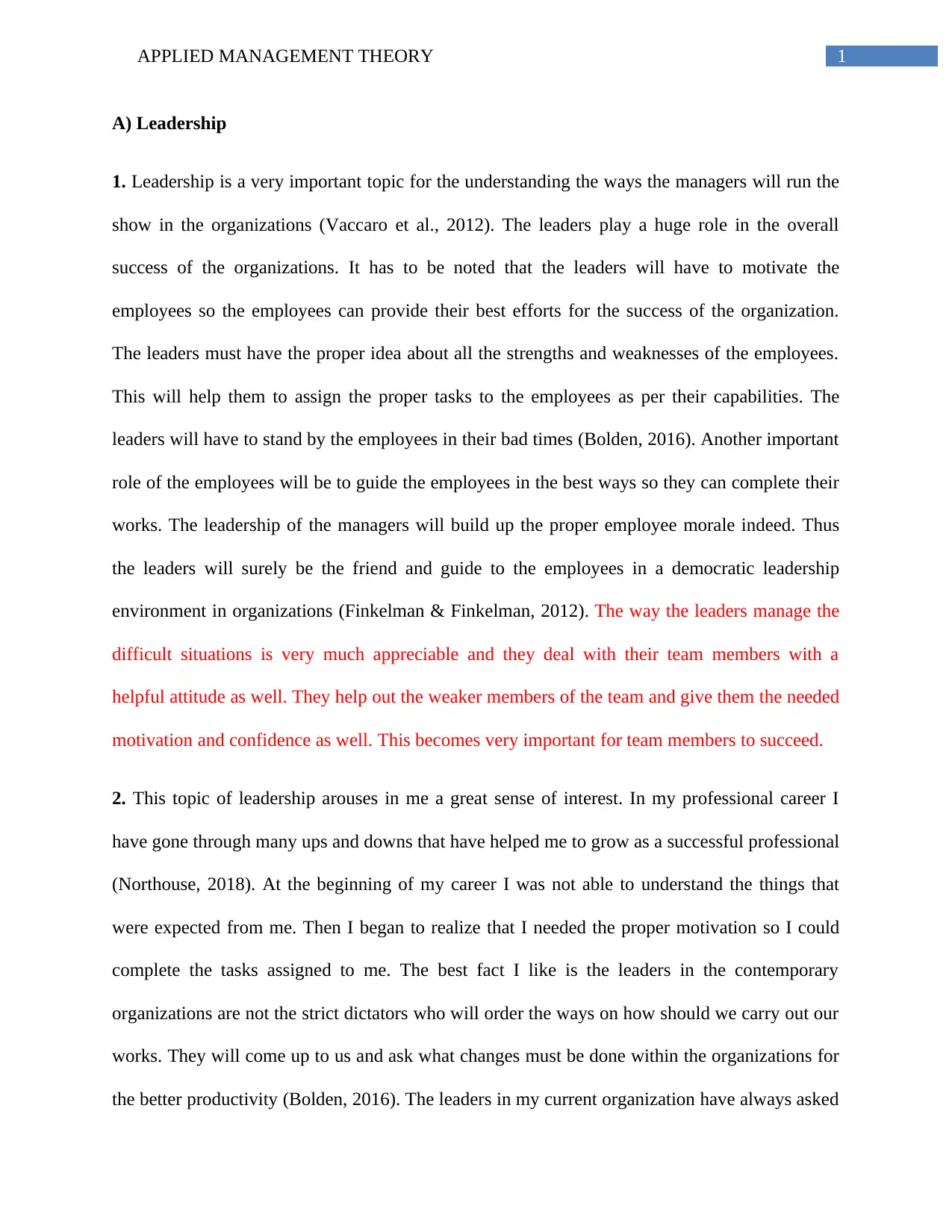
1APPLIED MANAGEMENT THEORY
A) Leadership
1. Leadership is a very important topic for the understanding the ways the managers will run the
show in the organizations (Vaccaro et al., 2012). The leaders play a huge role in the overall
success of the organizations. It has to be noted that the leaders will have to motivate the
employees so the employees can provide their best efforts for the success of the organization.
The leaders must have the proper idea about all the strengths and weaknesses of the employees.
This will help them to assign the proper tasks to the employees as per their capabilities. The
leaders will have to stand by the employees in their bad times (Bolden, 2016). Another important
role of the employees will be to guide the employees in the best ways so they can complete their
works. The leadership of the managers will build up the proper employee morale indeed. Thus
the leaders will surely be the friend and guide to the employees in a democratic leadership
environment in organizations (Finkelman & Finkelman, 2012). The way the leaders manage the
difficult situations is very much appreciable and they deal with their team members with a
helpful attitude as well. They help out the weaker members of the team and give them the needed
motivation and confidence as well. This becomes very important for team members to succeed.
2. This topic of leadership arouses in me a great sense of interest. In my professional career I
have gone through many ups and downs that have helped me to grow as a successful professional
(Northouse, 2018). At the beginning of my career I was not able to understand the things that
were expected from me. Then I began to realize that I needed the proper motivation so I could
complete the tasks assigned to me. The best fact I like is the leaders in the contemporary
organizations are not the strict dictators who will order the ways on how should we carry out our
works. They will come up to us and ask what changes must be done within the organizations for
the better productivity (Bolden, 2016). The leaders in my current organization have always asked
A) Leadership
1. Leadership is a very important topic for the understanding the ways the managers will run the
show in the organizations (Vaccaro et al., 2012). The leaders play a huge role in the overall
success of the organizations. It has to be noted that the leaders will have to motivate the
employees so the employees can provide their best efforts for the success of the organization.
The leaders must have the proper idea about all the strengths and weaknesses of the employees.
This will help them to assign the proper tasks to the employees as per their capabilities. The
leaders will have to stand by the employees in their bad times (Bolden, 2016). Another important
role of the employees will be to guide the employees in the best ways so they can complete their
works. The leadership of the managers will build up the proper employee morale indeed. Thus
the leaders will surely be the friend and guide to the employees in a democratic leadership
environment in organizations (Finkelman & Finkelman, 2012). The way the leaders manage the
difficult situations is very much appreciable and they deal with their team members with a
helpful attitude as well. They help out the weaker members of the team and give them the needed
motivation and confidence as well. This becomes very important for team members to succeed.
2. This topic of leadership arouses in me a great sense of interest. In my professional career I
have gone through many ups and downs that have helped me to grow as a successful professional
(Northouse, 2018). At the beginning of my career I was not able to understand the things that
were expected from me. Then I began to realize that I needed the proper motivation so I could
complete the tasks assigned to me. The best fact I like is the leaders in the contemporary
organizations are not the strict dictators who will order the ways on how should we carry out our
works. They will come up to us and ask what changes must be done within the organizations for
the better productivity (Bolden, 2016). The leaders in my current organization have always asked
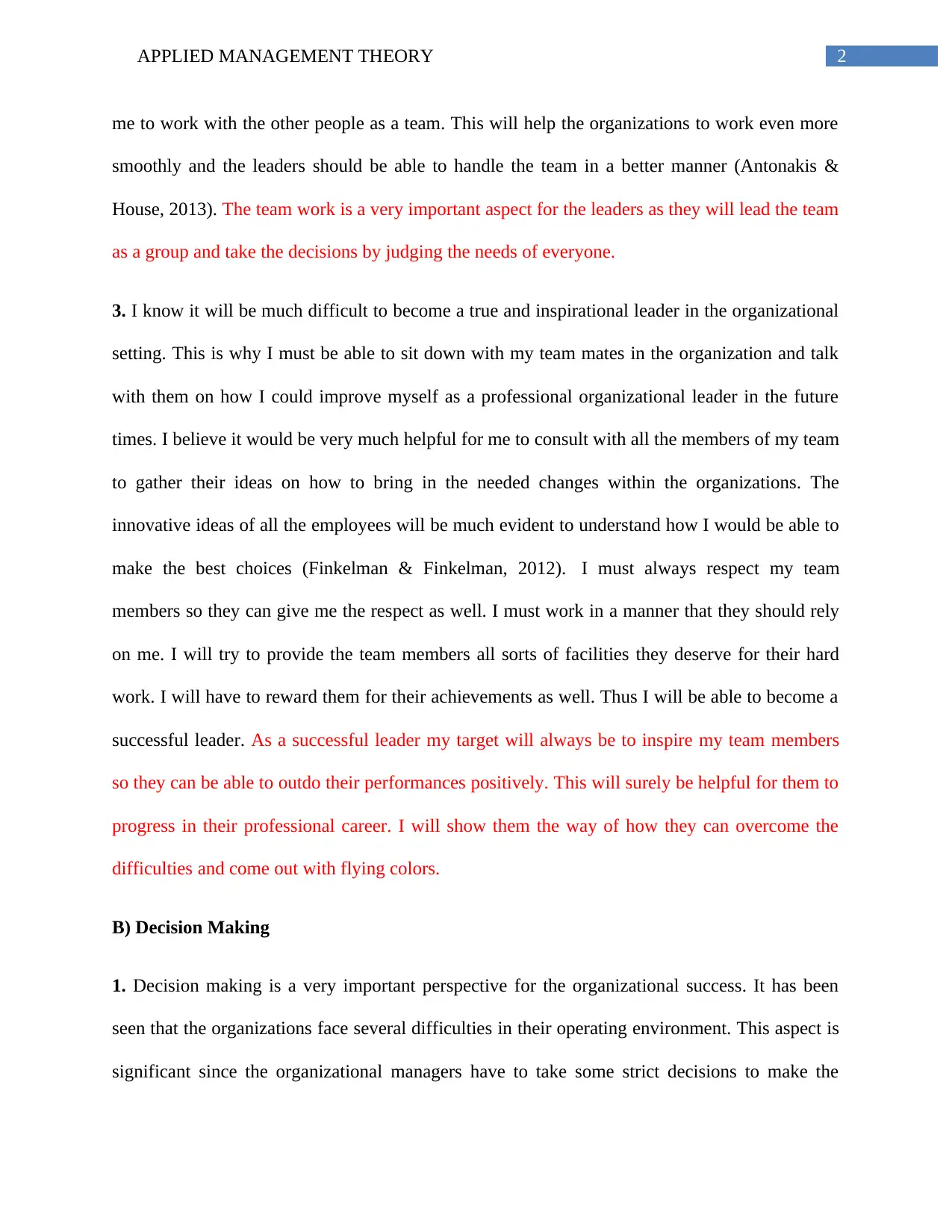
2APPLIED MANAGEMENT THEORY
me to work with the other people as a team. This will help the organizations to work even more
smoothly and the leaders should be able to handle the team in a better manner (Antonakis &
House, 2013). The team work is a very important aspect for the leaders as they will lead the team
as a group and take the decisions by judging the needs of everyone.
3. I know it will be much difficult to become a true and inspirational leader in the organizational
setting. This is why I must be able to sit down with my team mates in the organization and talk
with them on how I could improve myself as a professional organizational leader in the future
times. I believe it would be very much helpful for me to consult with all the members of my team
to gather their ideas on how to bring in the needed changes within the organizations. The
innovative ideas of all the employees will be much evident to understand how I would be able to
make the best choices (Finkelman & Finkelman, 2012). I must always respect my team
members so they can give me the respect as well. I must work in a manner that they should rely
on me. I will try to provide the team members all sorts of facilities they deserve for their hard
work. I will have to reward them for their achievements as well. Thus I will be able to become a
successful leader. As a successful leader my target will always be to inspire my team members
so they can be able to outdo their performances positively. This will surely be helpful for them to
progress in their professional career. I will show them the way of how they can overcome the
difficulties and come out with flying colors.
B) Decision Making
1. Decision making is a very important perspective for the organizational success. It has been
seen that the organizations face several difficulties in their operating environment. This aspect is
significant since the organizational managers have to take some strict decisions to make the
me to work with the other people as a team. This will help the organizations to work even more
smoothly and the leaders should be able to handle the team in a better manner (Antonakis &
House, 2013). The team work is a very important aspect for the leaders as they will lead the team
as a group and take the decisions by judging the needs of everyone.
3. I know it will be much difficult to become a true and inspirational leader in the organizational
setting. This is why I must be able to sit down with my team mates in the organization and talk
with them on how I could improve myself as a professional organizational leader in the future
times. I believe it would be very much helpful for me to consult with all the members of my team
to gather their ideas on how to bring in the needed changes within the organizations. The
innovative ideas of all the employees will be much evident to understand how I would be able to
make the best choices (Finkelman & Finkelman, 2012). I must always respect my team
members so they can give me the respect as well. I must work in a manner that they should rely
on me. I will try to provide the team members all sorts of facilities they deserve for their hard
work. I will have to reward them for their achievements as well. Thus I will be able to become a
successful leader. As a successful leader my target will always be to inspire my team members
so they can be able to outdo their performances positively. This will surely be helpful for them to
progress in their professional career. I will show them the way of how they can overcome the
difficulties and come out with flying colors.
B) Decision Making
1. Decision making is a very important perspective for the organizational success. It has been
seen that the organizations face several difficulties in their operating environment. This aspect is
significant since the organizational managers have to take some strict decisions to make the
⊘ This is a preview!⊘
Do you want full access?
Subscribe today to unlock all pages.

Trusted by 1+ million students worldwide
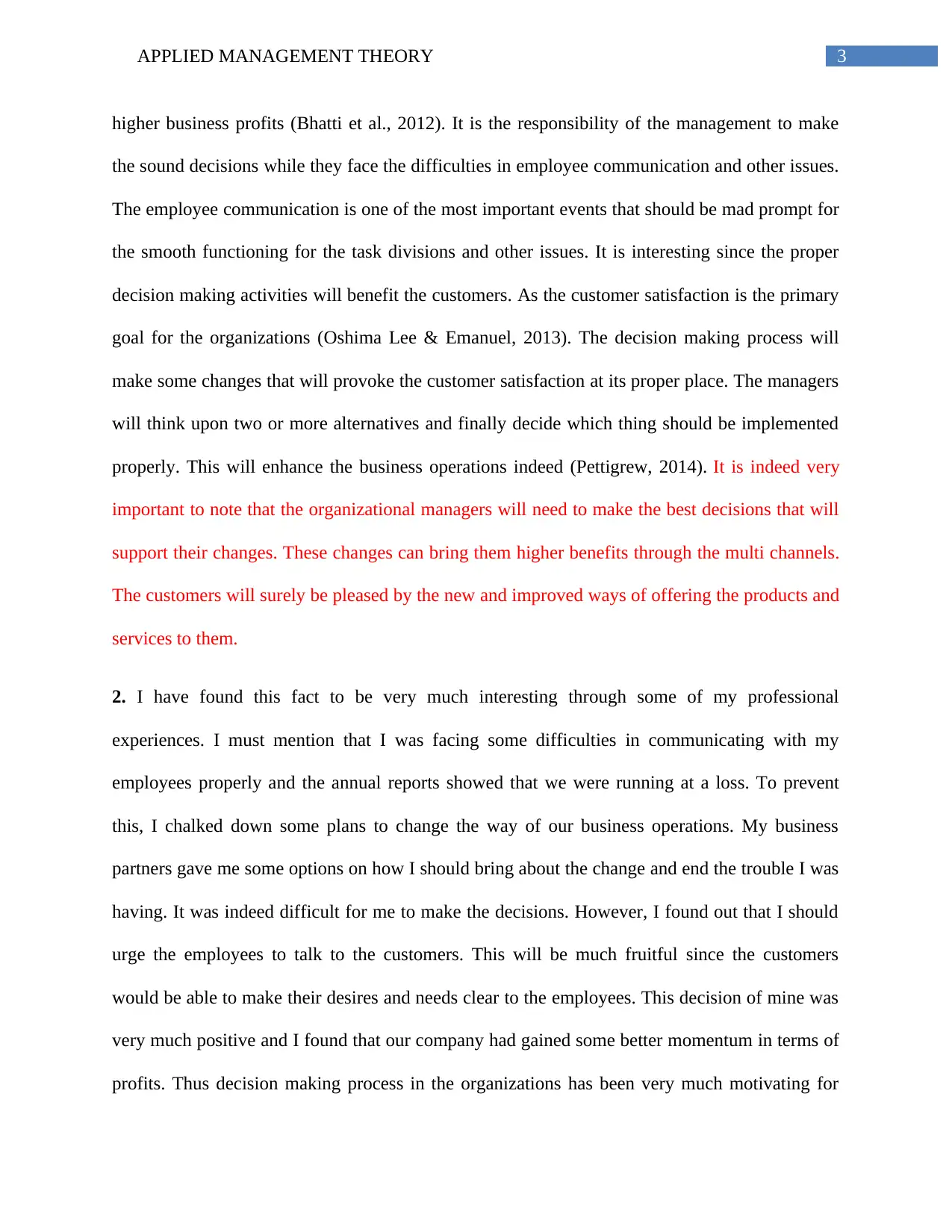
3APPLIED MANAGEMENT THEORY
higher business profits (Bhatti et al., 2012). It is the responsibility of the management to make
the sound decisions while they face the difficulties in employee communication and other issues.
The employee communication is one of the most important events that should be mad prompt for
the smooth functioning for the task divisions and other issues. It is interesting since the proper
decision making activities will benefit the customers. As the customer satisfaction is the primary
goal for the organizations (Oshima Lee & Emanuel, 2013). The decision making process will
make some changes that will provoke the customer satisfaction at its proper place. The managers
will think upon two or more alternatives and finally decide which thing should be implemented
properly. This will enhance the business operations indeed (Pettigrew, 2014). It is indeed very
important to note that the organizational managers will need to make the best decisions that will
support their changes. These changes can bring them higher benefits through the multi channels.
The customers will surely be pleased by the new and improved ways of offering the products and
services to them.
2. I have found this fact to be very much interesting through some of my professional
experiences. I must mention that I was facing some difficulties in communicating with my
employees properly and the annual reports showed that we were running at a loss. To prevent
this, I chalked down some plans to change the way of our business operations. My business
partners gave me some options on how I should bring about the change and end the trouble I was
having. It was indeed difficult for me to make the decisions. However, I found out that I should
urge the employees to talk to the customers. This will be much fruitful since the customers
would be able to make their desires and needs clear to the employees. This decision of mine was
very much positive and I found that our company had gained some better momentum in terms of
profits. Thus decision making process in the organizations has been very much motivating for
higher business profits (Bhatti et al., 2012). It is the responsibility of the management to make
the sound decisions while they face the difficulties in employee communication and other issues.
The employee communication is one of the most important events that should be mad prompt for
the smooth functioning for the task divisions and other issues. It is interesting since the proper
decision making activities will benefit the customers. As the customer satisfaction is the primary
goal for the organizations (Oshima Lee & Emanuel, 2013). The decision making process will
make some changes that will provoke the customer satisfaction at its proper place. The managers
will think upon two or more alternatives and finally decide which thing should be implemented
properly. This will enhance the business operations indeed (Pettigrew, 2014). It is indeed very
important to note that the organizational managers will need to make the best decisions that will
support their changes. These changes can bring them higher benefits through the multi channels.
The customers will surely be pleased by the new and improved ways of offering the products and
services to them.
2. I have found this fact to be very much interesting through some of my professional
experiences. I must mention that I was facing some difficulties in communicating with my
employees properly and the annual reports showed that we were running at a loss. To prevent
this, I chalked down some plans to change the way of our business operations. My business
partners gave me some options on how I should bring about the change and end the trouble I was
having. It was indeed difficult for me to make the decisions. However, I found out that I should
urge the employees to talk to the customers. This will be much fruitful since the customers
would be able to make their desires and needs clear to the employees. This decision of mine was
very much positive and I found that our company had gained some better momentum in terms of
profits. Thus decision making process in the organizations has been very much motivating for
Paraphrase This Document
Need a fresh take? Get an instant paraphrase of this document with our AI Paraphraser
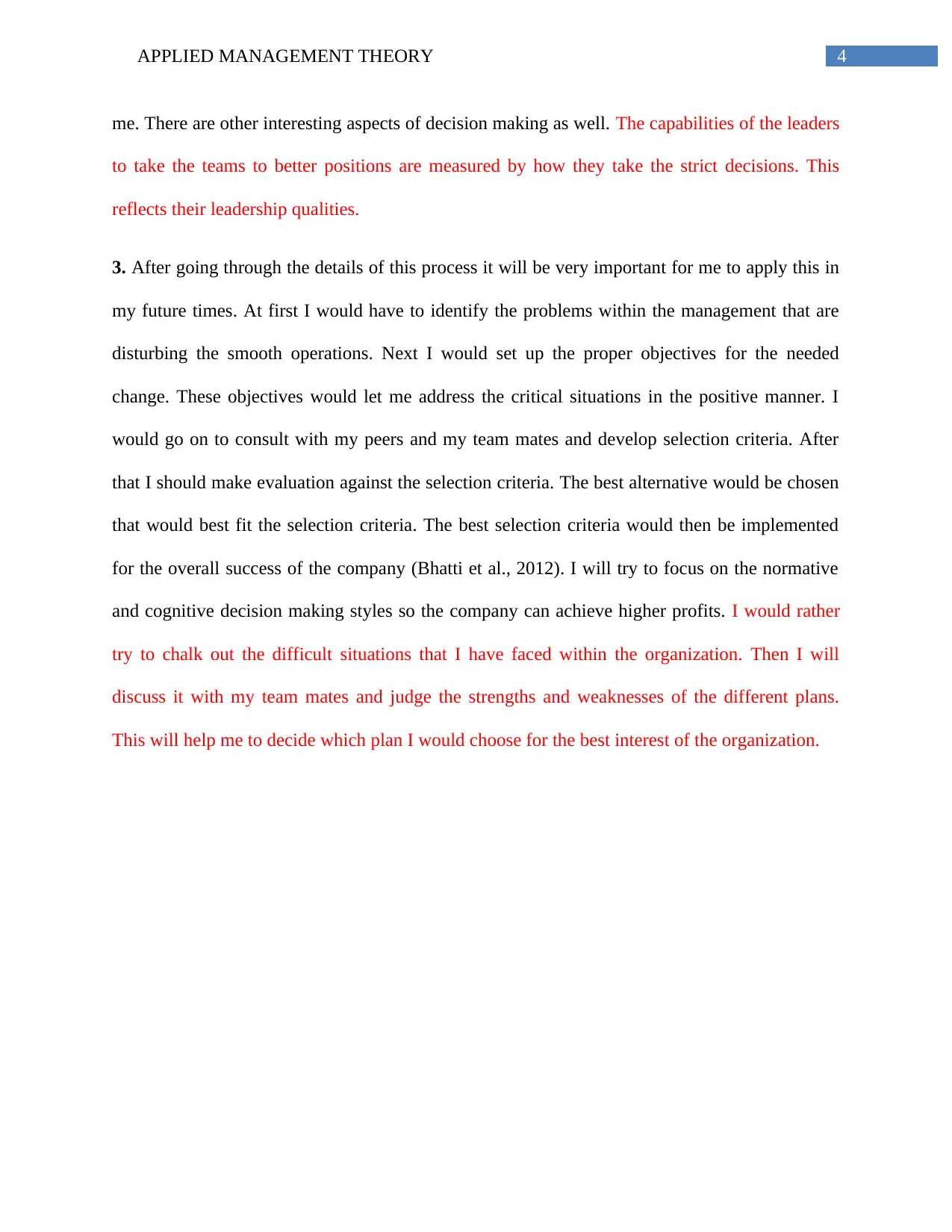
4APPLIED MANAGEMENT THEORY
me. There are other interesting aspects of decision making as well. The capabilities of the leaders
to take the teams to better positions are measured by how they take the strict decisions. This
reflects their leadership qualities.
3. After going through the details of this process it will be very important for me to apply this in
my future times. At first I would have to identify the problems within the management that are
disturbing the smooth operations. Next I would set up the proper objectives for the needed
change. These objectives would let me address the critical situations in the positive manner. I
would go on to consult with my peers and my team mates and develop selection criteria. After
that I should make evaluation against the selection criteria. The best alternative would be chosen
that would best fit the selection criteria. The best selection criteria would then be implemented
for the overall success of the company (Bhatti et al., 2012). I will try to focus on the normative
and cognitive decision making styles so the company can achieve higher profits. I would rather
try to chalk out the difficult situations that I have faced within the organization. Then I will
discuss it with my team mates and judge the strengths and weaknesses of the different plans.
This will help me to decide which plan I would choose for the best interest of the organization.
me. There are other interesting aspects of decision making as well. The capabilities of the leaders
to take the teams to better positions are measured by how they take the strict decisions. This
reflects their leadership qualities.
3. After going through the details of this process it will be very important for me to apply this in
my future times. At first I would have to identify the problems within the management that are
disturbing the smooth operations. Next I would set up the proper objectives for the needed
change. These objectives would let me address the critical situations in the positive manner. I
would go on to consult with my peers and my team mates and develop selection criteria. After
that I should make evaluation against the selection criteria. The best alternative would be chosen
that would best fit the selection criteria. The best selection criteria would then be implemented
for the overall success of the company (Bhatti et al., 2012). I will try to focus on the normative
and cognitive decision making styles so the company can achieve higher profits. I would rather
try to chalk out the difficult situations that I have faced within the organization. Then I will
discuss it with my team mates and judge the strengths and weaknesses of the different plans.
This will help me to decide which plan I would choose for the best interest of the organization.
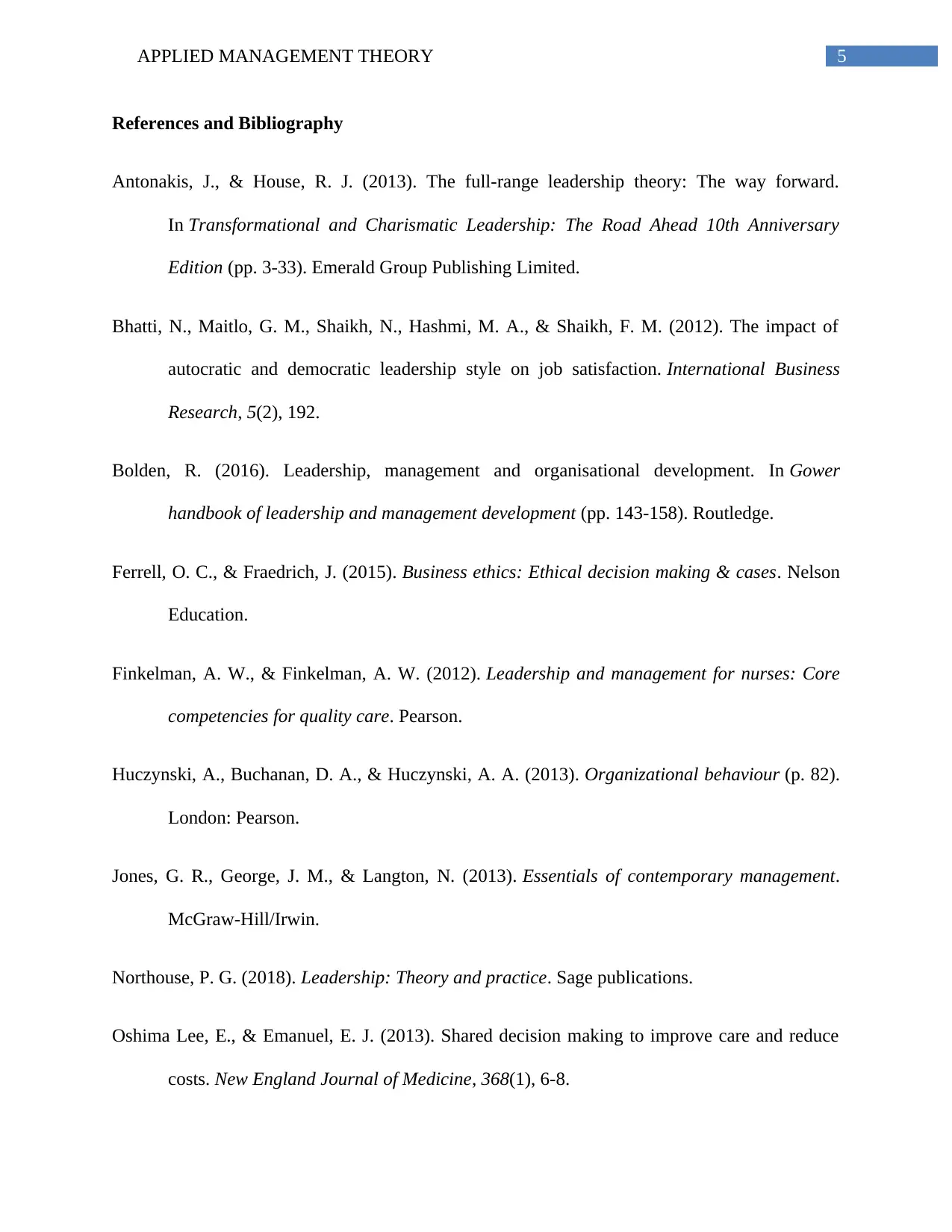
5APPLIED MANAGEMENT THEORY
References and Bibliography
Antonakis, J., & House, R. J. (2013). The full-range leadership theory: The way forward.
In Transformational and Charismatic Leadership: The Road Ahead 10th Anniversary
Edition (pp. 3-33). Emerald Group Publishing Limited.
Bhatti, N., Maitlo, G. M., Shaikh, N., Hashmi, M. A., & Shaikh, F. M. (2012). The impact of
autocratic and democratic leadership style on job satisfaction. International Business
Research, 5(2), 192.
Bolden, R. (2016). Leadership, management and organisational development. In Gower
handbook of leadership and management development (pp. 143-158). Routledge.
Ferrell, O. C., & Fraedrich, J. (2015). Business ethics: Ethical decision making & cases. Nelson
Education.
Finkelman, A. W., & Finkelman, A. W. (2012). Leadership and management for nurses: Core
competencies for quality care. Pearson.
Huczynski, A., Buchanan, D. A., & Huczynski, A. A. (2013). Organizational behaviour (p. 82).
London: Pearson.
Jones, G. R., George, J. M., & Langton, N. (2013). Essentials of contemporary management.
McGraw-Hill/Irwin.
Northouse, P. G. (2018). Leadership: Theory and practice. Sage publications.
Oshima Lee, E., & Emanuel, E. J. (2013). Shared decision making to improve care and reduce
costs. New England Journal of Medicine, 368(1), 6-8.
References and Bibliography
Antonakis, J., & House, R. J. (2013). The full-range leadership theory: The way forward.
In Transformational and Charismatic Leadership: The Road Ahead 10th Anniversary
Edition (pp. 3-33). Emerald Group Publishing Limited.
Bhatti, N., Maitlo, G. M., Shaikh, N., Hashmi, M. A., & Shaikh, F. M. (2012). The impact of
autocratic and democratic leadership style on job satisfaction. International Business
Research, 5(2), 192.
Bolden, R. (2016). Leadership, management and organisational development. In Gower
handbook of leadership and management development (pp. 143-158). Routledge.
Ferrell, O. C., & Fraedrich, J. (2015). Business ethics: Ethical decision making & cases. Nelson
Education.
Finkelman, A. W., & Finkelman, A. W. (2012). Leadership and management for nurses: Core
competencies for quality care. Pearson.
Huczynski, A., Buchanan, D. A., & Huczynski, A. A. (2013). Organizational behaviour (p. 82).
London: Pearson.
Jones, G. R., George, J. M., & Langton, N. (2013). Essentials of contemporary management.
McGraw-Hill/Irwin.
Northouse, P. G. (2018). Leadership: Theory and practice. Sage publications.
Oshima Lee, E., & Emanuel, E. J. (2013). Shared decision making to improve care and reduce
costs. New England Journal of Medicine, 368(1), 6-8.
⊘ This is a preview!⊘
Do you want full access?
Subscribe today to unlock all pages.

Trusted by 1+ million students worldwide
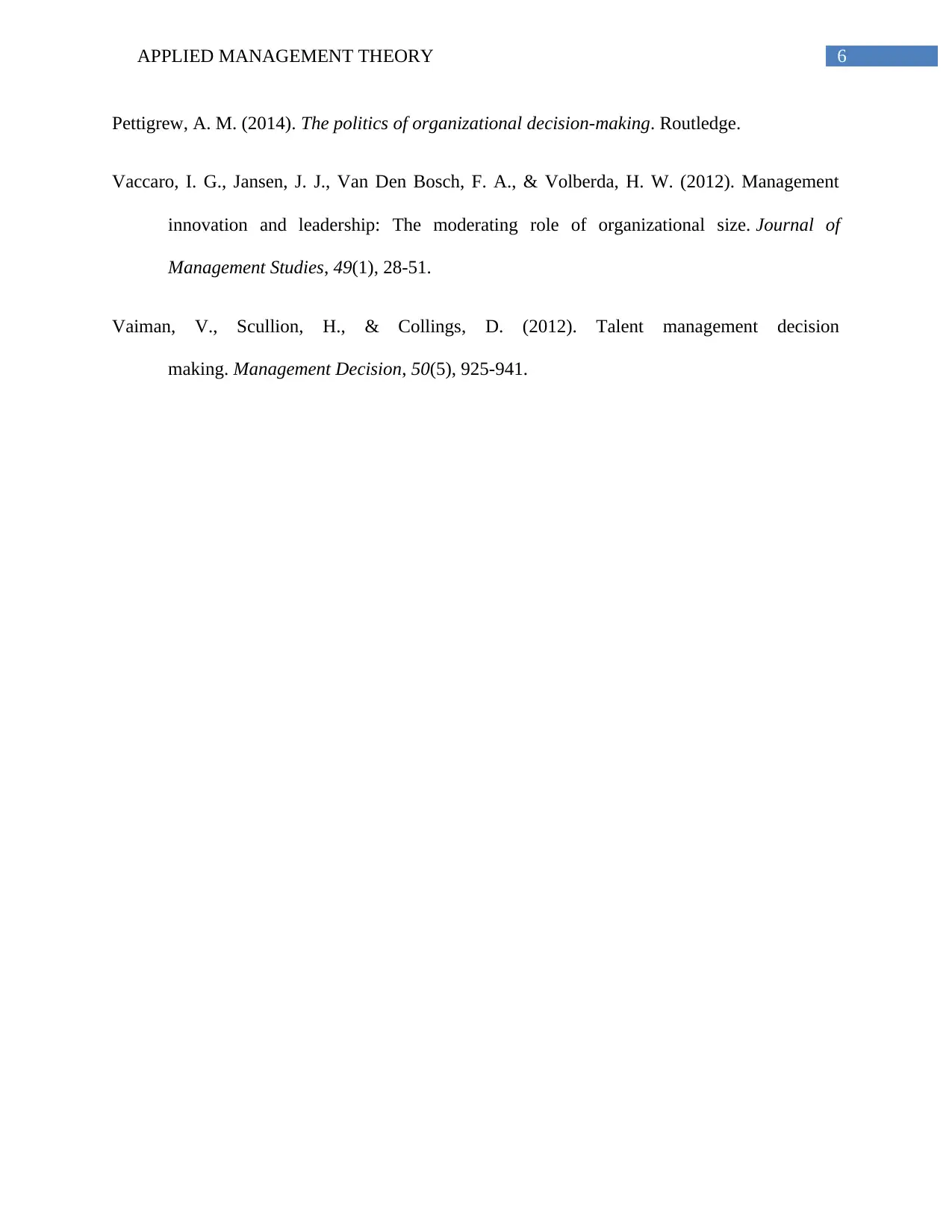
6APPLIED MANAGEMENT THEORY
Pettigrew, A. M. (2014). The politics of organizational decision-making. Routledge.
Vaccaro, I. G., Jansen, J. J., Van Den Bosch, F. A., & Volberda, H. W. (2012). Management
innovation and leadership: The moderating role of organizational size. Journal of
Management Studies, 49(1), 28-51.
Vaiman, V., Scullion, H., & Collings, D. (2012). Talent management decision
making. Management Decision, 50(5), 925-941.
Pettigrew, A. M. (2014). The politics of organizational decision-making. Routledge.
Vaccaro, I. G., Jansen, J. J., Van Den Bosch, F. A., & Volberda, H. W. (2012). Management
innovation and leadership: The moderating role of organizational size. Journal of
Management Studies, 49(1), 28-51.
Vaiman, V., Scullion, H., & Collings, D. (2012). Talent management decision
making. Management Decision, 50(5), 925-941.
1 out of 7
Related Documents
Your All-in-One AI-Powered Toolkit for Academic Success.
+13062052269
info@desklib.com
Available 24*7 on WhatsApp / Email
![[object Object]](/_next/static/media/star-bottom.7253800d.svg)
Unlock your academic potential
Copyright © 2020–2026 A2Z Services. All Rights Reserved. Developed and managed by ZUCOL.





